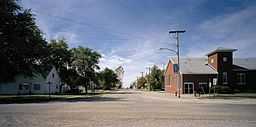Wapella, Illinois
| Wapella | |
| Village | |
 Main Street | |
| Country | United States |
|---|---|
| State | Illinois |
| County | DeWitt |
| Elevation | 743 ft (226 m) |
| Coordinates | 40°13′17″N 88°57′46″W / 40.22139°N 88.96278°WCoordinates: 40°13′17″N 88°57′46″W / 40.22139°N 88.96278°W |
| Area | 0.53 sq mi (1 km2) |
| - land | 0.53 sq mi (1 km2) |
| - water | 0.00 sq mi (0 km2) |
| Population | 558 (2010) |
| Density | 1,193.6 / sq mi (461 / km2) |
| Timezone | CST (UTC-6) |
| - summer (DST) | CDT (UTC-5) |
| Postal code | 61777 |
| Area code | 217 |
  Location of Wapella within Illinois
| |
| Wikimedia Commons: Wapella, Illinois | |
Wapella is a village in DeWitt County, Illinois, United States. The population was 558 at the 2010 census.
History
Wapella was founded in 1854. It was laid out by David Neil, the surveyor of much of the Illinois Central Railroad Line. The village population was approximately 500 residents by the beginning of the Civil War, and has grown to a little over 600 residents in the early twenty-first century. The Illinois Central Railroad located its rail shops in Wapella in its early days before shifting to Clinton, Illinois, five miles south of Wapella. Clinton was the third largest rail switching center in the United States during the Civil War.
A group of settlers from Kentucky was the first of European origin to call Wapella home; afterwich, a substantial Irish community came to Wapella to build and work on the Illinois Central Railroad, as well as a later group of settlers from Kentucky and Germany. Abraham and Elizabeth Swearingen, grandparents of Al Swearengen (featured in the HBO series Deadwood) settled in nearby Wapella Township, and Daniel and Keziah Swearingen - Al's parents - met and married in nearby McLean, Illinois, before moving to Mahaska County, Iowa where Al was born.
Wapella boasts some of the most productive agriculture land in the country, and is well known for its extensive drainage system maintaining a rich agricultural economy. Production of seed corn, field corn, and soybeans are large enterprises in Wapella and surrounding townships.
Wapella supports both a Roman Catholic and a Christian church, each of which has undergone restoration since 2003.
Geography
Wapella is located at 40°13′17″N 88°57′46″W / 40.22139°N 88.96278°W (40.221285, -88.962715).[1]
According to the 2010 census, the village has a total area of 0.53 square miles (1.4 km2), all land.[2]
Demographics
As of the census[3] of 2000, there were 651 people, 253 households, and 184 families residing in the village. The population density was 1,193.6 people per square mile (457.0/km²). There were 276 housing units at an average density of 506.0 per square mile (193.8/km²). The racial makeup of the village was 99.23% White, 0.46% Native American, 0.15% from other races, and 0.15% from two or more races. Hispanic or Latino of any race were 0.92% of the population.
There were 253 households out of which 35.6% had children under the age of 18 living with them, 60.9% were married couples living together, 8.7% had a female householder with no husband present, and 26.9% were non-families. 24.1% of all households were made up of individuals and 12.6% had someone living alone who was 65 years of age or older. The average household size was 2.57 and the average family size was 3.04.
In the village the population was spread out with 26.6% under the age of 18, 11.1% from 18 to 24, 31.3% from 25 to 44, 20.3% from 45 to 64, and 10.8% who were 65 years of age or older. The median age was 32 years. For every 100 females there were 104.1 males. For every 100 females age 18 and over, there were 92.7 males.
The median income for a household in the village was $38,000, and the median income for a family was $44,063. Males had a median income of $34,844 versus $21,957 for females. The per capita income for the village was $17,395. About 5.5% of families and 8.1% of the population were below the poverty line, including 9.8% of those under age 18 and 6.8% of those age 65 or over.
=References
- ↑ "US Gazetteer files: 2010, 2000, and 1990". United States Census Bureau. 2011-02-12. Retrieved 2011-04-23.
- ↑ "2010 Census U.S. Gazetteer Files for Places – Illinois". United States Census. Retrieved 2012-10-13.
- ↑ "American FactFinder". United States Census Bureau. Retrieved 2008-01-31.
External links
| |||||||||||||||||||||||||||||